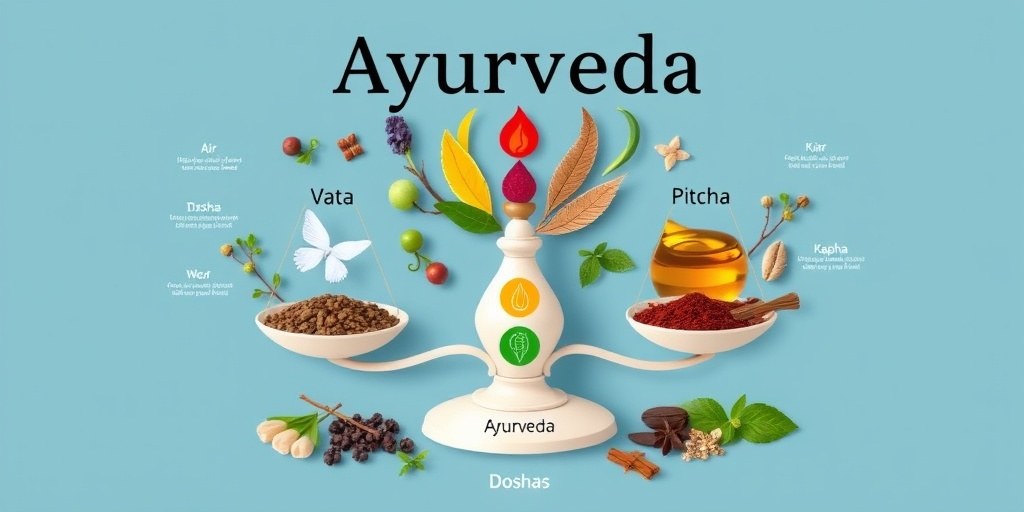What Is Ayurveda?
Ayurveda, often referred to as the “science of life,” is an ancient holistic healing system that originated in India over 5,000 years ago. It is a comprehensive approach to health and wellness that emphasizes the balance between the body, mind, and spirit. The term “Ayurveda” is derived from two Sanskrit words: “Ayur,” meaning life, and “Veda,” meaning knowledge or science. This traditional practice is not just about treating illness; it focuses on promoting overall well-being and preventing disease through a balanced lifestyle.
At its core, Ayurveda recognizes that each individual is unique, with distinct physical, emotional, and spiritual needs. This personalized approach is what sets Ayurveda apart from many conventional medical practices. By understanding your body type, or “dosha,” Ayurveda provides tailored recommendations for diet, exercise, and lifestyle choices that align with your specific constitution.
The Importance of Ayurveda Today
In today’s fast-paced world, many people are turning to Ayurveda as a natural alternative to conventional medicine. With its emphasis on prevention and holistic healing, Ayurveda offers valuable insights into maintaining health and vitality. Whether you’re seeking relief from chronic conditions or simply looking to enhance your overall well-being, Ayurveda provides a wealth of knowledge and practices that can be integrated into daily life.
Principles of Ayurveda
The principles of Ayurveda are rooted in the belief that health is a state of balance among the body, mind, and spirit. Here are some key concepts that form the foundation of this ancient practice:
1. The Five Elements
Ayurveda is based on the idea that everything in the universe, including our bodies, is composed of five elements: earth, water, fire, air, and ether. These elements combine to form three primary energies, known as doshas:
- Vata: Composed of air and ether, Vata governs movement and communication.
- Pitta: Made up of fire and water, Pitta is responsible for digestion and metabolism.
- Kapha: Formed from earth and water, Kapha provides structure and stability.
Each person has a unique combination of these doshas, which influences their physical and emotional characteristics. Understanding your dosha can help you make informed choices about your diet and lifestyle.
2. The Concept of Agni
Agni, or digestive fire, is another fundamental principle in Ayurveda. It refers to the body’s ability to digest food, absorb nutrients, and eliminate waste. A strong Agni is essential for maintaining health, while a weak Agni can lead to various health issues. Ayurveda emphasizes the importance of nourishing Agni through proper diet, mindful eating, and lifestyle practices.
3. The Role of Ojas
Ojas is considered the essence of vitality and immunity in Ayurveda. It is the result of balanced doshas and strong Agni. When Ojas is abundant, individuals experience good health, energy, and resilience against illness. Practices such as meditation, yoga, and a balanced diet can help enhance Ojas and promote overall well-being.
4. The Importance of Routine
Ayurveda places great emphasis on daily routines, known as “dinacharya.” Establishing a consistent daily schedule can help regulate bodily functions and promote balance. This includes practices such as waking up early, practicing yoga or meditation, eating meals at regular times, and getting adequate sleep. By aligning your daily activities with natural rhythms, you can enhance your physical and mental health.
5. Personalized Nutrition
Ayurveda advocates for a personalized approach to nutrition, recognizing that different foods affect individuals differently based on their dosha. For example, Vata types may benefit from warm, moist foods, while Pitta types may thrive on cooling, hydrating foods. By understanding your unique dietary needs, you can make choices that support your health and well-being.
In conclusion, Ayurveda offers a holistic framework for understanding health and wellness. By embracing its principles, you can cultivate a balanced lifestyle that nurtures your body, mind, and spirit. For those interested in exploring Ayurveda further, resources like Yesil Health AI (yesilhealth.com) provide evidence-based answers to your health questions, helping you navigate your wellness journey with confidence. 🌿✨

Ayurveda Doshas Explained
Ayurveda, an ancient system of medicine that originated in India over 5,000 years ago, is based on the belief that health and wellness depend on a delicate balance between the mind, body, and spirit. Central to this philosophy are the three doshas: Vata, Pitta, and Kapha. Each dosha represents a unique combination of the five elements—earth, water, fire, air, and ether—and plays a crucial role in determining an individual’s physical and mental characteristics.
Understanding the Three Doshas
- Vata: Composed of air and ether, Vata is associated with movement and creativity. Individuals with a dominant Vata dosha are often energetic, quick-thinking, and adaptable. However, when out of balance, they may experience anxiety, restlessness, and digestive issues.
- Pitta: Made up of fire and water, Pitta governs transformation and metabolism. Those with a strong Pitta dosha are typically ambitious, focused, and passionate. When imbalanced, they may become irritable, overheated, and prone to inflammatory conditions.
- Kapha: Combining earth and water, Kapha is linked to stability and structure. People with a predominant Kapha dosha are usually calm, nurturing, and reliable. However, an excess of Kapha can lead to lethargy, weight gain, and emotional heaviness.
How to Determine Your Dosha
Understanding your dosha is essential for personalizing your Ayurvedic experience. You can determine your dosha through various methods, including:
- Self-Assessment Quizzes: Many online resources offer dosha quizzes that help you identify your primary dosha based on your physical traits, emotional tendencies, and lifestyle.
- Consultation with an Ayurvedic Practitioner: For a more accurate assessment, consider consulting with a qualified Ayurvedic practitioner who can provide personalized insights and recommendations.
Balancing Your Doshas
Once you identify your dosha, the next step is to maintain balance. Here are some tips:
- Diet: Each dosha has specific dietary needs. For instance, Vata types benefit from warm, moist foods, while Pitta types thrive on cooling foods. Kapha types should focus on light, stimulating meals.
- Lifestyle Choices: Incorporate activities that align with your dosha. Vata types may enjoy yoga and meditation, Pitta types might benefit from cooling exercises like swimming, and Kapha types can engage in vigorous workouts.
- Herbal Remedies: Ayurvedic herbs can help balance doshas. For example, Ashwagandha is great for Vata, while Turmeric is beneficial for Pitta, and Ginger can help Kapha.
Ayurveda Benefits
Embracing Ayurveda can lead to numerous health benefits, enhancing both physical and mental well-being. Here are some of the key advantages:
Holistic Healing
Ayurveda takes a holistic approach to health, addressing not just the symptoms of a disease but also its root causes. This comprehensive perspective allows for more effective and sustainable healing.
Personalized Wellness
One of the standout features of Ayurveda is its emphasis on individualization. By understanding your unique dosha, you can tailor your diet, lifestyle, and treatments to suit your specific needs, leading to improved health outcomes.
Stress Reduction
Ayurveda offers various techniques for stress management, including meditation, yoga, and breathing exercises. These practices help calm the mind, reduce anxiety, and promote emotional balance, making it easier to navigate life’s challenges. 🧘♀️
Improved Digestion
Ayurvedic principles emphasize the importance of digestion, or Agni. By following Ayurvedic dietary guidelines, individuals can enhance their digestive health, leading to better nutrient absorption and overall vitality.
Enhanced Immunity
Regular Ayurvedic practices, such as detoxification and herbal supplementation, can strengthen the immune system. This proactive approach helps the body fend off illnesses and maintain optimal health.
Increased Energy Levels
By balancing the doshas and following a personalized regimen, many individuals report increased energy levels and improved vitality. This boost can enhance productivity and overall quality of life.
In conclusion, Ayurveda offers a wealth of knowledge and practices that can significantly improve your health and well-being. By understanding your dosha and embracing Ayurvedic principles, you can embark on a journey toward a more balanced and fulfilling life. 🌿

Ayurveda Diet and Nutrition
Ayurveda, an ancient system of medicine that originated in India over 5,000 years ago, emphasizes the importance of a balanced diet tailored to individual needs. The Ayurveda diet is not just about what you eat, but also how you eat, when you eat, and the overall lifestyle you lead. Let’s explore the fundamental principles of Ayurveda nutrition and how they can enhance your well-being.
The Three Doshas
At the core of Ayurveda are the three doshas: Vata, Pitta, and Kapha. Each dosha represents a combination of the five elements (earth, water, fire, air, and ether) and governs various physiological and psychological functions in the body. Understanding your dosha is crucial for creating a personalized diet plan.
- Vata: Characterized by air and space, Vata individuals tend to be creative and energetic but may struggle with anxiety and dryness. A diet rich in warm, moist, and grounding foods, such as cooked grains, root vegetables, and healthy fats, is beneficial.
- Pitta: Dominated by fire and water, Pitta types are often ambitious and focused but can become overheated or irritable. Cooling foods like leafy greens, cucumbers, and sweet fruits help balance Pitta.
- Kapha: Composed of earth and water, Kapha individuals are typically calm and steady but may experience lethargy. A diet that includes light, spicy, and stimulating foods, such as legumes, bitter greens, and warm spices, is ideal.
Key Principles of Ayurveda Nutrition
In addition to understanding your dosha, Ayurveda promotes several key principles for optimal nutrition:
- Fresh and Seasonal Foods: Eating fresh, seasonal produce ensures that you receive the maximum nutritional benefits and aligns your body with nature’s rhythms.
- Mindful Eating: Ayurveda encourages you to eat with intention. This means savoring each bite, chewing thoroughly, and avoiding distractions during meals.
- Proper Food Combinations: Certain food combinations can enhance digestion and nutrient absorption. For example, pairing grains with legumes creates a complete protein.
- Hydration: Staying hydrated is essential. Warm water or herbal teas are preferred over cold beverages, as they support digestion.
Ayurveda and Weight Management
Many people turn to Ayurveda for weight management. By understanding your dosha and following a balanced diet, you can achieve a healthy weight naturally. Incorporating regular physical activity, such as yoga or walking, further supports your weight loss journey. Remember, Ayurveda emphasizes a holistic approach, so it’s not just about diet but also about maintaining a balanced lifestyle.
Ayurveda Treatments and Therapies
Ayurveda offers a wide range of treatments and therapies designed to restore balance and promote healing. These therapies are tailored to individual needs and can address various health concerns. Here are some popular Ayurveda treatments:
Panchakarma
Panchakarma is a detoxification and rejuvenation therapy that involves five primary actions to cleanse the body of toxins. This comprehensive treatment includes:
- Vamana: Therapeutic vomiting to eliminate excess mucus and toxins.
- Virechana: Purgation therapy to cleanse the digestive system.
- Basti: Enema therapy to detoxify the colon.
- Nasya: Nasal administration of herbal oils to clear the sinuses.
- Raktamokshana: Bloodletting to remove impurities from the bloodstream.
Ayurvedic Massage
Ayurveda massage, or Abhyanga, is a therapeutic oil massage that promotes relaxation and rejuvenation. This treatment uses warm herbal oils tailored to your dosha, helping to improve circulation, relieve stress, and enhance overall well-being. Regular Ayurvedic massage can also support skin health and boost immunity.
Herbal Remedies
Herbs play a vital role in Ayurveda. Various herbal formulations are used to address specific health issues, from digestive disorders to skin conditions. Some commonly used herbs include:
- Turmeric: Known for its anti-inflammatory properties.
- Ashwagandha: An adaptogen that helps combat stress.
- Brahmi: Supports cognitive function and mental clarity.
Yoga and Meditation
Incorporating yoga and meditation into your daily routine is essential in Ayurveda. These practices not only enhance physical health but also promote mental clarity and emotional balance. Regular yoga sessions can improve flexibility, strength, and overall vitality, while meditation fosters mindfulness and reduces stress.
By embracing the principles of Ayurveda, you can create a holistic approach to health that nourishes your body, mind, and spirit. Whether through diet, treatments, or lifestyle changes, Ayurveda offers a path to achieving optimal wellness. 🌿✨

Ayurveda Lifestyle Practices
Ayurveda, an ancient system of medicine that originated in India over 5,000 years ago, emphasizes a holistic approach to health and well-being. It focuses on balancing the body, mind, and spirit through various lifestyle practices. By integrating these practices into your daily routine, you can enhance your overall health and vitality. Here are some key Ayurveda lifestyle practices to consider:
1. Daily Routine (Dinacharya)
Establishing a daily routine, known as Dinacharya, is fundamental in Ayurveda. This practice helps to align your body with the natural rhythms of the day. Here are some essential components:
- Wake Up Early: Rise with the sun to harness the energy of the morning.
- Hydrate: Start your day with a glass of warm water to flush out toxins.
- Yoga and Meditation: Engage in gentle yoga and meditation to promote mental clarity and physical flexibility.
- Self-Massage (Abhyanga): Use warm oils to massage your body, enhancing circulation and relaxation.
2. Nutrition (Ayurveda Ernährung)
Food plays a crucial role in Ayurveda. The concept of Ayurveda Ernährung emphasizes eating according to your body type (dosha) and the seasons. Here are some tips:
- Know Your Dosha: Identify your dosha (Vata, Pitta, or Kapha) to tailor your diet accordingly.
- Eat Fresh and Seasonal: Incorporate seasonal fruits and vegetables to maintain balance.
- Mindful Eating: Practice mindfulness while eating to enhance digestion and satisfaction.
3. Herbal Remedies
Ayurveda utilizes a variety of herbs to support health. Incorporating herbal remedies can enhance your well-being:
- Turmeric: Known for its anti-inflammatory properties, turmeric can be added to meals or consumed as a tea.
- Ashwagandha: This adaptogenic herb helps reduce stress and improve mental clarity.
- Triphala: A blend of three fruits that aids digestion and detoxification.
4. Seasonal Adjustments (Ritucharya)
Adapting your lifestyle and diet according to the seasons, known as Ritucharya, is vital in Ayurveda. Each season has its unique qualities, and aligning with them can promote health:
- Summer: Focus on cooling foods like cucumbers and melons.
- Winter: Incorporate warming spices like ginger and cinnamon.
Ayurveda for Mental Health
In today’s fast-paced world, mental health is more important than ever. Ayurveda offers valuable insights and practices to support mental well-being. Here’s how Ayurveda can help:
1. Understanding the Mind-Body Connection
Ayurveda recognizes the profound connection between the mind and body. Mental health issues often manifest physically, and vice versa. By addressing both aspects, Ayurveda promotes holistic healing.
2. Stress Management
Stress is a common contributor to mental health challenges. Ayurveda provides various techniques to manage stress effectively:
- Meditation: Regular meditation practice can calm the mind and reduce anxiety.
- Breathing Exercises (Pranayama): Techniques like Nadi Shodhana (alternate nostril breathing) can balance energy and promote relaxation.
3. Herbal Support for Mental Clarity
Several Ayurvedic herbs are known for their positive effects on mental health:
- Brahmi: Enhances cognitive function and memory.
- Gotu Kola: Supports mental clarity and reduces anxiety.
4. Lifestyle Adjustments
Making simple lifestyle changes can significantly impact mental health:
- Regular Exercise: Engage in physical activities like yoga or walking to release endorphins.
- Quality Sleep: Prioritize sleep hygiene to ensure restorative rest.
By incorporating these Ayurveda practices into your life, you can foster a balanced and healthy mind and body. Whether you’re exploring Ayurveda in Frankfurt or seeking Ayurveda massage therapies, the principles of this ancient system can guide you toward a more harmonious existence. 🌿✨

Frequently Asked Questions about Ayurveda
What is Ayurveda?
Ayurveda is an ancient system of medicine that originated in India over 3,000 years ago. It focuses on balancing the body, mind, and spirit to promote overall health and well-being. The term itself means “knowledge of life” in Sanskrit.
How does Ayurveda work?
Ayurveda works by identifying an individual’s unique constitution, or dosha, which is determined by a combination of physical, mental, and emotional characteristics. Treatments often include herbal remedies, dietary changes, yoga, and meditation to restore balance.
What are the main types of Ayurvedic treatments?
- Ayurveda massage: A therapeutic massage that uses herbal oils to promote relaxation and healing.
- Ayurveda kur: A detoxification process that helps cleanse the body of toxins.
- Ayurveda nutrition: A dietary approach that emphasizes eating according to one’s dosha for optimal health.
Can Ayurveda help with specific health issues?
Yes, Ayurveda can be beneficial for various health issues, including stress management, digestive disorders, skin conditions, and chronic pain. It emphasizes a holistic approach, addressing the root causes of ailments rather than just symptoms.
Where can I find Ayurveda services in Germany?
In Germany, you can find various Ayurveda centers and practitioners, especially in cities like Frankfurt and Berlin. Many wellness retreats also offer Ayurvedic treatments and programs.
What is an Ayurveda type test?
An Ayurveda type test is a questionnaire designed to help individuals determine their dosha. This assessment can guide you in making lifestyle and dietary choices that align with your unique constitution.
Is Ayurveda safe?
When practiced by qualified practitioners, Ayurveda is generally considered safe. However, it’s essential to consult with a healthcare provider before starting any new treatment, especially if you have pre-existing health conditions or are taking medications.
What is the meaning of Ayurveda?
The meaning of Ayurveda translates to “the science of life.” It encompasses a comprehensive understanding of health, wellness, and the interconnectedness of body, mind, and spirit.
Can Ayurveda be practiced alongside Western medicine?
Yes, many people choose to integrate Ayurveda with Western medicine for a more holistic approach to health. It’s important to communicate with both your Ayurvedic practitioner and your healthcare provider to ensure safe and effective care.
What are some popular Ayurvedic retreats?
Some popular Ayurvedic retreats can be found in locations like Sri Lanka and various wellness centers in Europe. These retreats often offer immersive experiences that include treatments, yoga, and dietary guidance.




